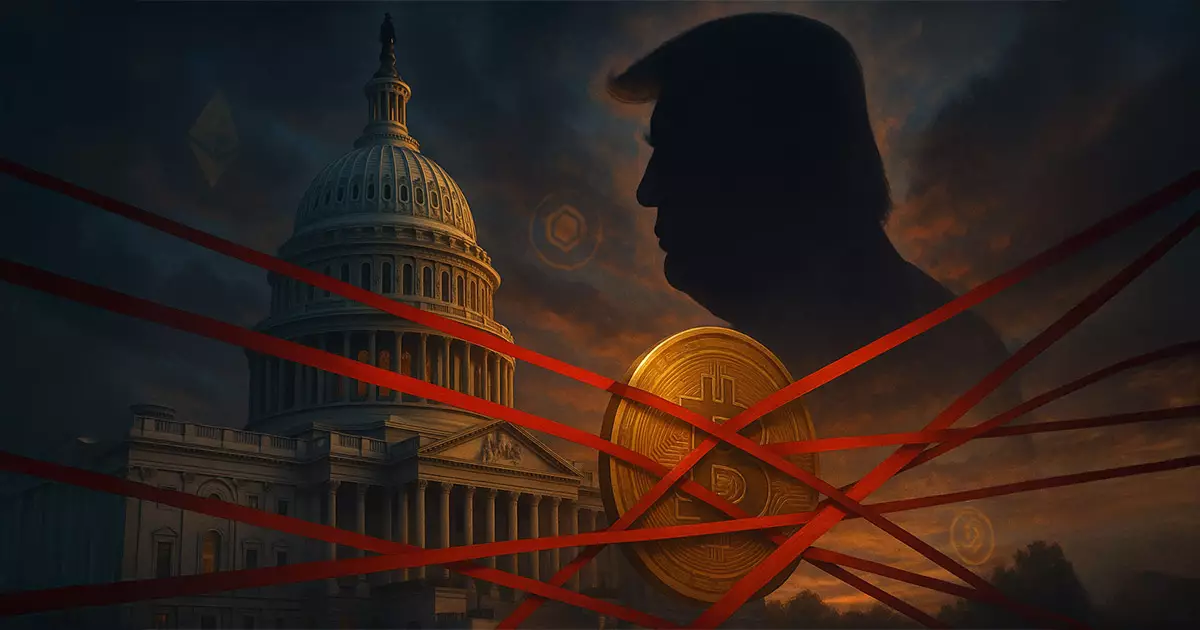The recent surge in discussions surrounding President Donald Trump’s crypto asset ventures illustrates a profound dilemma that stands at the nexus of personal enrichment and public policy. For many, these conversations signal not just a concern for the integrity of individual politicians, but also a glaring inadequacy in the safeguarding structures that are supposed to protect U.S. legislative developments from such conflicts of interest. The ethical haze surrounding Trump’s financial pursuits in the crypto market is more than a mere footnote; it’s a glaring issue that casts a long shadow over important legislation, particularly the proposed stablecoin regulations under the GENIUS Act, which promise to shape the future of digital currencies in the U.S.
The GENIUS Act: A Legislative Lifeline Clouded by Controversy
Despite being heralded as a critical step towards regulatory clarity, the GENIUS Act has encountered a myriad of roadblocks, with the most significant being the explicit and favorable exposure of President Trump’s business interests in the crypto space. Ryan Gilbert, founder of Launchpad Capital, poignantly articulated that the intersection of personal entrepreneurship and public policymaking has become an impediment to the advancement of beneficial and necessary legislation. The hope is for leaders to prioritize the larger societal good over individual financial incentives—a hope that appears increasingly naive given the current political climate. Just when the Senate stood poised to pass this act, it faltered with a narrow 48-49 vote, reflecting a culmination of distrust that continues to fester within the political arena.
Moreover, the very premise of the GENIUS Act—to create a framework for payment stablecoins—could provide immense financial and operational stability in the growing crypto marketplace. Yet, as public scrutiny intensifies over Trump’s alleged financial gains tied to crypto ventures, legislators find themselves caught in a complex web where personal profit threatens to derail a broader economic strategy.
The Memecoin Scandal: A Cautionary Tale of Profit and Loss
The meteoric rise and subsequent plunge of the $TRUMP memecoin stands as an emblematic illustration of the potential hazards within the crypto landscape—hazards further complicated by personal ties to the presidency. Launched shortly before his inauguration, this memecoin exemplifies how ambition can quickly transform into a risky gamble for everyday investors, many of whom lost significant funds as the currency’s value plummeted post-inauguration. Reports indicate that while ordinary investors faced substantial financial losses exceeding $2 billion, Trump-linked enterprises reaped approximately $100 million in trading fees, accentuating the troubling trajectory of capital from the public to the private sector.
Even more alarming is the speculated role of Trump’s family in potentially leveraging their connections to stake a claim in Binance, which already faced scrutiny from regulators for violations of anti-money laundering laws. Herein lies a fundamental paradox: Trump’s financial interests may not only influence his political agenda but also dare to shape regulatory outcomes in favor of his ventures, undermining the very legitimacy of governance. If lawmakers are to maintain any semblance of credibility, they must examine what appears to be politically sanctioned profiteering.
The Bipartisan Outcry: Voices Against Corruption
The reaction from both sides of the aisle has been visceral, with many Democratic senators demanding accountability. Congresswoman Maxine Waters did not mince words, suggesting that Trump’s financial maneuvers signify a betrayal of the public trust. With claims of Trump pocketing at least $350 million from these crypto dealings, there’s an undeniable sensation that this is not merely business as usual, but a façade covering a more nefarious scheme to exploit public office for private gain.
Senator Mark Kelly’s introduction of the “End Crypto Corruption Act” signals a recognition that existing regulations are woefully inadequate for navigating the complexities that new financial technologies bring. He articulated an imperative truth: the very architecture of our political and legislative systems might be at risk if figures in power are allowed to financially capitalize on their positions.
The Urgency for Reform in a Rapidly Evolving Landscape
As negotiations towards revisiting the GENIUS Act commence, both parties must grapple with the ramifications of allowing personal interests to filter into public policy. It is essential to establish robust safeguards that prioritize clear lines between political influence and financial gain, particularly as digital currencies rapidly evolve and permeate everyday commerce. The American public deserves transparency and integrity in leadership, and now, more than ever, legislators must be willing to confront the uncomfortable truths that threaten to undermine foundational democratic processes.
As willing as Trump may seem to navigate this new territory, the stakes are simply too high to permit allegiances to blend with personal ambitions. The urgency for effective regulatory measures is palpable, and failure to act decisively could lead to further erosion of public trust and integrity in government. The shifting landscape of crypto demands not just innovative solutions but principled leadership willing to prioritize the greater good over personal gain.














